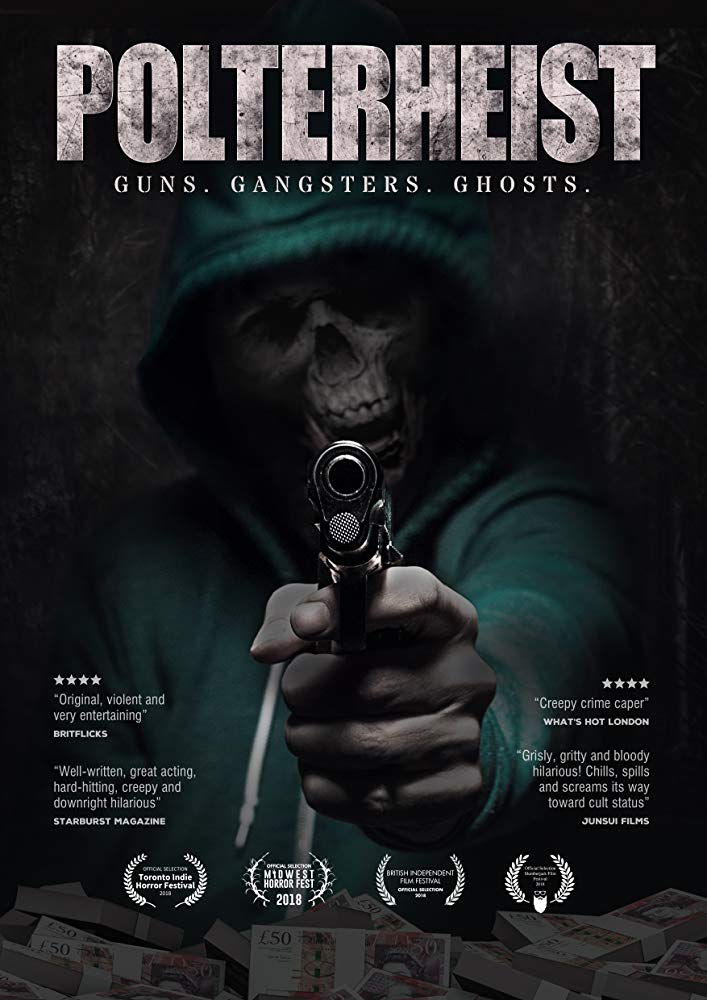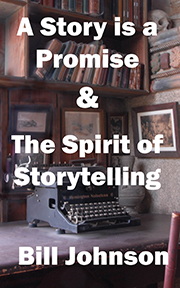| A Story is a Promise |
|
|
| Essays on the Craft of Writing |
| About the Author |
Notes on the film Polterheist

One aspect of a well-made movie is dramatic clarity. This clarity comes from introducing what a story's about and how the main characters are involved in advancing the action.
An example of this clarity can be found in the low-budget British film Polterheist.
The title is the first step in that clarity, suggesting a movie about a heist with a supernatural element.
The opening scene is two men, Tariq and Boxy, sitting in a warehouse corridor listening to a man in the warehouse being worked over. Boxy is rough-hewn, obliviously raised poor and working class. Tariq is South Asian and wearing a shiny suit, but facial scars suggests he's lived a dangerous life.
When they get inside, they see a soon to be victim of the sadistic Uday, the local Pakistani gang chief in a British town.
Boxy and Tariq are grilled about the whereabouts of Frank, someone they work with who is missing with 15,000 pounds in Uday's money. Uday is Tariq's uncle.
A flashback reveals there's a catch for Boxy and Tariq to find Frank. Boxy has already accidentally killed Frank while trying to find out what he did with the money.
Boxy and Tariq are given four days to find Frank and the money.
This countdown gives a frame for the ensuring action, a deadline they must meet or risk being killed.
This kind of deadline is often used in film and TV series because when set up well, it works.
It frames a question: Can they find the money and save themselves?
The thread that runs through the movie revolves around allegiance. Are the allegiances of the main characters to friends? Spouses? Tribe? The dead?
After the opening scenes the movie than shifts to a psychic who gives a local detective information that helps them find bodies and solve a long-ago, highly publicized crime. This puts the psychic all over the local news.
Meanwhile, Boxy and Tariq go to chat with Frank's ex-wife, a hard-bitten woman who knows them both very well. While Boxy is upstairs looking for clues, Frank's ex-wife figures out Tariq has done something to Frank. To silence her, Tariq shoots her in the head.
When Boxy finds out, he wants to flee with his wife, but Tariq's passport is held by Uday.
For his part, Uday is told he needs to come up with five million in diamonds if he wants to escape an arranged tribal marriage back in Pakistan. Even the murderous Uday who is powerful enough to command sexual services has a problem he has to deal with.
There's an very interesting shot of church bells ringing on one side of town while the Islamic call to prayer sounds on the other side. The environment here is a part of this story.
In another scene, there's a shot of a storefront for Islamic Treasures next to a shop that sells dresses aimed at an Indian market. Again, subtext.
The film now cuts to a Polish crime boss and family. That family needs to take small bills from drug transactions, change them into large bills, and get those onto a plane to Poland via a stewardess. This scheme is aided by some Jewish men.
The subtext here is that when the European Union opened borders, people in places like Poland went West in search of better lives. Others went to profit from the drug and sex trades. So there's a reason why there is a Polish crime family in this town.
Boxy realizes the psychic could be their long shot to contact Frank and find out what he did with the money.
When the psychic allows Frank to take possession of her body, this sets up the main dramatic question for the rest of the movie: Can the dead Frank lead Boxy and Tariq to the money?
Frank's possession of the psychic is conveyed with a change in the tone of her voice and dark circles under her eyes.
Frank does shows them what happened to the money he stole. He used it to buy tickets for an around the world cruise for his ex-wife dying of cancer, the woman Tariq shot.
Frank clearly has a score to settle with Boxy and Tariq, and he's also concerned about how his dog Lucy is treated (that Lucy is a dog, not a young woman, is a late reveal).
Because Frank can travel around while he's dead and spy on others, Frank suggests Boxy and Tariq rob the Poles when a courier takes money to the airport. They agree.
Unfortunately, the courier shows up at an airport parking lot in an identical vehicle to one driven by Uday's courier with the diamonds meant to pay off his arranged marriage.
In the bedlam, Boxy and Tariq rob Uday's courier, and the Polish courier escapes.
Uday thinks the Poles have stolen his diamonds, and this sets off a gang war.
Meanwhile, Frank promises to take Boxy and Tariq to the money he has buried. When they get there, Frank goads Boxy to throw dirt on Tariq's shiny suit and Tariq beats Boxy to death, and then Frank shoots Tariq.
Frank now has one final request of the psychic before he departs to the afterlife, that she take care of Lucy.
The psychic agrees, but abandons Lucy.
The police are left to deal with the exploding gang war, and Boxy's and Tariq's death appear to be casualties of that war.
The psychic returns to her office and retrieves the diamonds from a stuffed unicorn.
When a dead person appears and asks for her help, the psychic lets her know she can't afford her services.
End of film.
This is a darkly humorous horror film where the actors are given dramatic characters to play, characters who are compelled to act to resolve problems and navigate allegiances. The movie has action, humor and heartfelt moments.
In America, it would probably have an R rating for violence and sex.
A reason why I was thinking about this issue of dramatic clarity is I recently watched the current Harry Potter universe movie, The Crimes of Grindelwald. I spent the movie wondering why a big budget film would have a main character who spends the film waiting for someone else to show up and advance the action.
I enjoyed the fanciful -- and artificial -- creatures in the film, but most of the actors are reduced to posing instead of playing characters.
The Potter movie reminded me of one of the Rocky sequels. Where the first movie had a main character enmeshed in his neighborhood and world -- and the vivid details of that world -- the sequels had a character who had no real connection to anything in the film's world.
When the details of a story world are simply flat description with no dramatic subtext, there's nothing to engage the attention. This holds true for both a novel manuscript and a screenplay.
Polterheist is an example of a low-budget film with details that ring true.
####################################
For more information about Polterheist, visit http://polterheistfilm.com/
Director:
David Gilbank
Writers:
David Gilbank, Gemma Head, Paul Renhard
